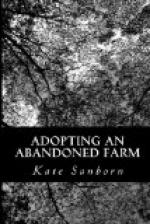“Oh, yes, I know it.”
“What is it?” I persisted.
“Well, I know it just as well, but can’t just now get the name out.” A pause, then, with great superiority: “I’d rather see a potato field in full bloom, than all the flowers in the world.”
Perhaps some of Tolstoi’s disciples may yet solve the problem of New England’s abandoned farms. He believes that every able-bodied man should labor with his own hands and in “the sweat of his brow” to produce his own living direct from the soil. He dignifies agriculture above all other means of earning a living, and would have artificial employments given up. “Back to the land,” he cries; and back he really goes, daily working with the peasants. But ’tis a solemn, almost tragical experience, not much better than the fate of the Siberian exile. Rise at dawn; work till dark; eat—go to bed too tired to read a paper;—and no money in it.
Let these once prosperous farms be given up to Swedish colonies, hard working and industrious, who can do better here than in their own country and have plenty of social life among themselves, or let wealthy men purchase half a dozen of these places to make a park, or two score for a hunting ground—or let unattached women of middle age occupy them and support themselves by raising poultry. Men are making handsome incomes from this business—women can do the same. The language of the poultry magazines, by the way, is equally sentimental and efflorescent with that of the speeches at agricultural fairs, sufficiently so to sicken one who has once accepted it as reliable, as for instance: “The individual must be very abnormal in his tastes if they can not be catered to by our feathered tribe.” “To their owner they are a thing of beauty and a joy forever. Their ways are interesting, their language fascinating, and their lives from the egg to the mature fowl replete with constant surprises."[1]
[Footnote 1: This clause is true.]
“To simply watch them as they pass from stage to stage of development fills the mind of every sane person with pleasure.” One poultry crank insists that each hen must be so carefully studied that she can be understood and managed as an individual, and speaks of his hens having at times an “anxious nervous expression!”
“Yes, it is where the hens sing all the day long in the barn-yard that throws off the stiff ways of our modern civilization and makes us feel that we are home and can rest and play and grow young once more. How many men and women have regained lost health and spirits in keeping hens, in the excitement of finding and gathering eggs!”
“It is not the natural laying season when snows lie deep on field and hill, when the frost tingles in sparkling beads from every twig, when the clear streams bear up groups of merry skaters,” etc.




